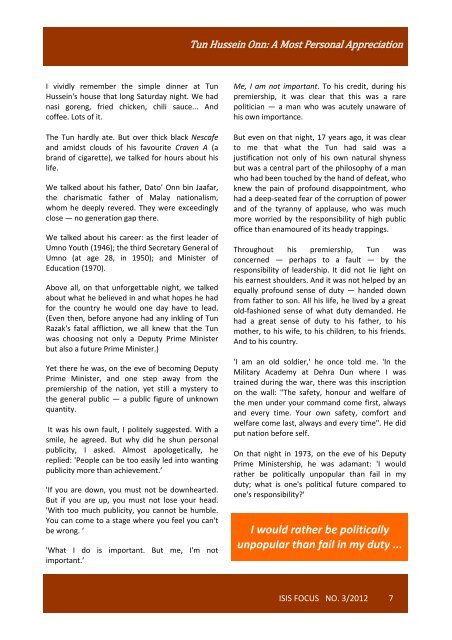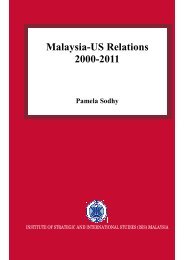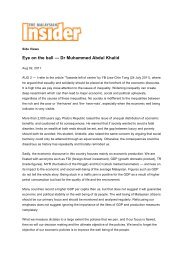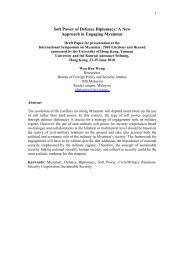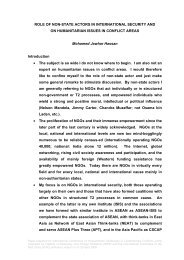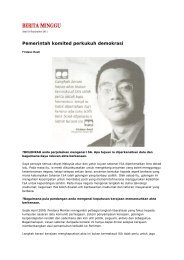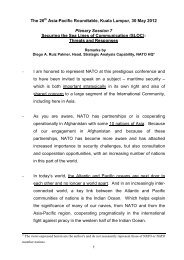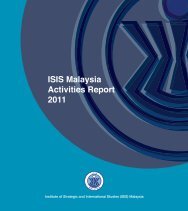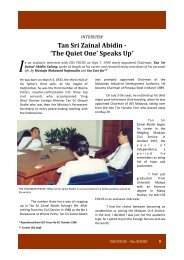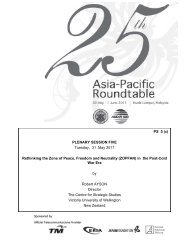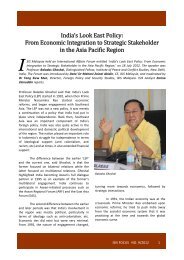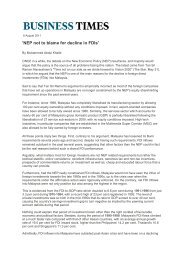Tun Hussein Onn:A Most Personal Appreciation - ISIS Malaysia
Tun Hussein Onn:A Most Personal Appreciation - ISIS Malaysia
Tun Hussein Onn:A Most Personal Appreciation - ISIS Malaysia
Create successful ePaper yourself
Turn your PDF publications into a flip-book with our unique Google optimized e-Paper software.
<strong>Tun</strong> <strong>Hussein</strong> <strong>Onn</strong>: A <strong>Most</strong> <strong>Personal</strong> <strong>Appreciation</strong><br />
I vividly remember the simple dinner at <strong>Tun</strong><br />
<strong>Hussein</strong>'s house that long Saturday night. We had<br />
nasi goreng, fried chicken, chili sauce... And<br />
coffee. Lots of it.<br />
The <strong>Tun</strong> hardly ate. But over thick black Nescafe<br />
and amidst clouds of his favourite Craven A (a<br />
brand of cigarette), we talked for hours about his<br />
life.<br />
We talked about his father, Dato’ <strong>Onn</strong> bin Jaafar,<br />
the charismatic father of Malay nationalism,<br />
whom he deeply revered. They were exceedingly<br />
close — no generation gap there.<br />
We talked about his career: as the first leader of<br />
Umno Youth (1946); the third Secretary General of<br />
Umno (at age 28, in 1950); and Minister of<br />
Education (1970).<br />
Above all, on that unforgettable night, we talked<br />
about what he believed in and what hopes he had<br />
for the country he would one day have to lead.<br />
(Even then, before anyone had any inkling of <strong>Tun</strong><br />
Razak's fatal affliction, we all knew that the <strong>Tun</strong><br />
was choosing not only a Deputy Prime Minister<br />
but also a future Prime Minister.)<br />
Yet there he was, on the eve of becoming Deputy<br />
Prime Minister, and one step away from the<br />
premiership of the nation, yet still a mystery to<br />
the general public — a public figure of unknown<br />
quantity.<br />
It was his own fault, I politely suggested. With a<br />
smile, he agreed. But why did he shun personal<br />
publicity, I asked. Almost apologetically, he<br />
replied: 'People can be too easily led into wanting<br />
publicity more than achievement.’<br />
'If you are down, you must not be downhearted.<br />
But if you are up, you must not lose your head.<br />
'With too much publicity, you cannot be humble.<br />
You can come to a stage where you feel you can't<br />
be wrong. ‘<br />
'What I do is important. But me, I'm not<br />
important.’<br />
Me, I am not important. To his credit, during his<br />
premiership, it was clear that this was a rare<br />
politician — a man who was acutely unaware of<br />
his own importance.<br />
But even on that night, 17 years ago, it was clear<br />
to me that what the <strong>Tun</strong> had said was a<br />
justification not only of his own natural shyness<br />
but was a central part of the philosophy of a man<br />
who had been touched by the hand of defeat, who<br />
knew the pain of profound disappointment, who<br />
had a deep‐seated fear of the corruption of power<br />
and of the tyranny of applause, who was much<br />
more worried by the responsibility of high public<br />
office than enamoured of its heady trappings.<br />
Throughout his premiership, <strong>Tun</strong> was<br />
concerned — perhaps to a fault — by the<br />
responsibility of leadership. It did not lie light on<br />
his earnest shoulders. And it was not helped by an<br />
equally profound sense of duty — handed down<br />
from father to son. All his life, he lived by a great<br />
old‐fashioned sense of what duty demanded. He<br />
had a great sense of duty to his father, to his<br />
mother, to his wife, to his children, to his friends.<br />
And to his country.<br />
'I am an old soldier,' he once told me. 'In the<br />
Military Academy at Dehra Dun where I was<br />
trained during the war, there was this inscription<br />
on the wall: "The safety, honour and welfare of<br />
the men under your command come first, always<br />
and every time. Your own safety, comfort and<br />
welfare come last, always and every time". He did<br />
put nation before self.<br />
On that night in 1973, on the eve of his Deputy<br />
Prime Ministership, he was adamant: 'I would<br />
rather be politically unpopular than fail in my<br />
duty; what is one's political future compared to<br />
one's responsibility?'<br />
I would rather be politically<br />
unpopular than fail in my duty ...<br />
<strong>ISIS</strong> FOCUS NO. 3/2012 7


